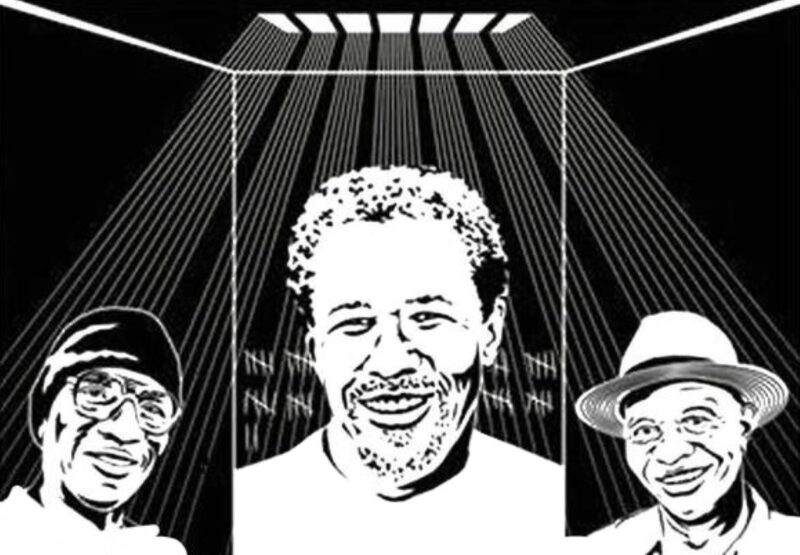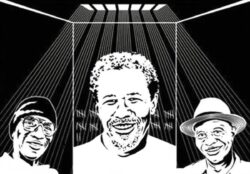Angola Three
Robert Hillary King, Albert Woodfox, and Herman Wallace, known as the Angola Three, survived over four decades of solitary confinement at the Louisiana State Penitentiary at Angola.

Wikimedia Commons
Drawing of the Angola 3. Rachid Mod, artist
Robert Hillary King, Albert Woodfox, and Herman Wallace are collectively known as the Angola Three. They survived over four decades in closed cell restriction (CCR) (also known as solitary confinement) at the Louisiana State Penitentiary at Angola. From behind bars they developed a social and political consciousness and became formidable contenders in a legal and policy battle of local, national, and international proportions. They successfully exposed systemic shortcomings and abuses in the criminal legal system as well as inspired reforms related to solitary confinement, cruel and unusual punishment, and torture. During their incarceration the Angola Three modeled the Black radical tradition while creating a template for multicultural organizing. The Angola Three’s experiences and impact have been recognized by the US Congress and the United Nations. Their story has been featured on Jeopardy and in the Smithsonian’s National Museum of African American History and Culture, among many other places.
Pre-CCR
Born in New Orleans, King, Woodfox, and Wallace were separately arrested on different robbery charges and sent to the Orleans Parish Prison (OPP), where twelve members of the Louisiana Chapter of the Black Panther Party (BPP) already awaited trial. King, Woodfox, and Wallace would join the BPP while in prison, and it would play a foundational role in the development of their thinking and social advocacy.
The BPP members were in custody after a September 15, 1970, militarized law enforcement ambush on their headquarters to prevent the BPP from operating in the state. The BPP members, who contended that law enforcement shot first, were charged with the attempted murder of five New Orleans Police Department officers. Some were also charged with aggravated battery, criminal anarchy, criminal trespassing, and federal gun violations. After more than a year in custody, a New Orleans jury found them “not guilty” on all counts.
While the BPP members awaited trial, they continued their efforts to serve and empower from within OPP. They viewed jail as little more than a relocation of their headquarters, holding political education, book study groups, and other classes; organizing and advocating for humane conditions; and providing aid and resources to those in need. King, Woodfox, and Wallace became BPP pupils. The three would spend the remainder of their lives crediting the BPP for the development of their social consciousness and for converting them into servants of the people.
Wallace’s bank robbery and Woodfox’s armed robbery conviction sent the men to Angola in 1969 and 1971, respectively. Angola was segregated, racial tensions were high, and violence and sexual exploitation were rampant. Wallace, Woodfox, and Ronald Ailsworth formed the first prison chapter of the BPP at Angola as a means of inspiring self-pride and as a response to Angola’s ills. They conducted self-defense as well as political and social education classes. They taught literacy skills and served as mentors to the “justice-impacted,” a term that refers to persons who have had an encounter with the legal system. The chapter formed an anti-rape squad and secured funds to ensure that every justice-impacted person in their reach had necessities. Woodfox stated, “We turned our tiers into a community” and showed that “unity made all of us stronger.”
During CCR
On April 17, 1972, Corrections Officer Brent Miller was violently attacked in an Angola dorm. Wallace and Woodfox were accused of the attack, swiftly removed from the general population, and placed in CCR (where they remained for most of their incarceration). They were tried separately. Angola retained fingerprints of every man placed in its custody, but crime scene blood evidence and fingerprints were not tested. In the absence of forensic evidence, both were convicted and sentenced to life in prison.
Following a 1971 armed robbery conviction, King was sent to the classification board in Angola’s admitting unit to get his housing assignment in late May 1972. Despite him not being at Angola when Miller was killed, he was also transferred to CCR because of a “pending investigation” that lasted the duration of his twenty-nine-year stay in CCR. (In nearly thirty years, no further explanation has ever been given for the circumstances of the pending investigation.) Further tragedy visited King. In 1973 twelve men were simultaneously released from their CCR cells for showers. One was stabbed during a fight. Another, Grady Brewer, was covered in blood and observed by a nearby guard with a weapon. King was convicted of that murder by 1974.
The Angola Three, who always maintained their innocence, were victims of unconstitutional trials and repeated reversals. In the cases of King and Woodfox, there were two trials. Each experienced reversals due to serious constitutional violations, such as jury and grand jury discrimination, denial of speedy trial rights, suppression of evidence, ineffective assistance of counsel, and perjured testimony.
While in solitary confinement the Angola Three were held in their single-person cells for twenty-three hours a day, seven days a week, with their only reprieve being a one-hour shower. Those six-by-nine-foot, self-contained cells contained a bunk, toilet, sink, compact metal table, and desk. The men were not allowed outdoor exercise, phone privileges, hot water, television, fans, review boards, contact visits, or access to law books. Review boards ritualistically denied their release from CCR “due to the original reason for lockdown.” In 2000 Wallace, King, and Woodfox filed a civil suit complaining of Eighth and Fourteenth Amendment violations. Despite the torturous conditions they lived under, Woodfox recalled that they managed to turn “cells meant to be death chambers and insane asylums” into “halls of debate and schools of philosophy, history, and economics.” Despite the gravity of the deprivation they faced, they did not denounce their BPP membership or cease practicing its principles or their belief in “the power of the people.”
Release
The Angola Three challenged their convictions and stay in CCR through a complicated labyrinth of administrative complaints, hearings, suits, trials, appeals, and post-conviction efforts that spanned decades. Then-Warden Burl Cain said in 2008 and 2009 that Woodfox and Wallace had to be held in CCR because they subscribed to “Black Pantherism.” State officials continuously opposed their release despite Miller’s widow becoming an Angola Three supporter. In 1997 BPP member Malik Rahim, from the OPP period, learned of their plight and organized a formal support committee. A national resurgence of prison abolitionist ideology and political prisoner release efforts claimed centerstage of the collective consciousness not long after, inspiring further support for the trio.
Eventually the men who had devoted their lives to community empowerment would have their own growing local, national, and international support group that advocated their cause and relentlessly protested their convictions and continued detainment in isolation. The men even garnered the support of Amnesty International, which made their cause a focal point of its work.
The Angola Three achieved freedom because of increasing awareness of criminal justice abuses, calls for the release of political prisoners, the emergence of abolitionist theory, pressures to end mass incarceration, and consistent and simultaneous efforts by a multitude of people, including the Angola Three, their legal and advocacy teams, justice-minded legal players, and a multiracial, multiethnic coalition of local, national, and international grassroots supporters.
After entering a guilty plea to a conspiracy to commit murder, King was released in 2001 after thirty-one years in prison (twenty-nine of them in CCR). As of 2024 he remains an advocate for human and prisoner rights. On October 1, 2013, Wallace’s forty-one-year incarceration in CCR ended when his conviction was overturned due to grand jury discrimination. Wallace succumbed to liver cancer four days later, on October 4, 2013, days shy of his seventy-second birthday. In 2016, after being imprisoned for forty-five years (forty-three in CCR), Woodfox was released on February 19, his birthday, in exchange for a settlement of the civil suit and a no-contest plea to manslaughter and burglary. He embraced freedom and used his time to fight for criminal justice reforms. On August 4, 2022, Woodfox died from complications of COVID-19, having the distinction of surviving isolation longer than anyone in the world (at the time of his death). He was seventy-five years old.
Legacy
The Angola Three’s story is one of abuses and excesses as much as it is one of resistance and resilience. King, Wallace, and Woodfox accomplished significant CCR reforms at and beyond Angola, such as contact visits, outdoor exercise, more frequent board reviews and exercise breaks, and access to television on the tier. They led a forty-five-day hunger strike that ended the dehumanizing practice of serving meals under the cell door. Instead, slits were cut into cell doors so food trays could be passed at waist level. They also ended automatic strip searches, which involved a degrading search of a prisoner’s rectum. From a prison within a prison, they managed to raise awareness of systemic and human rights abuses involving justice-impacted populations, the harms of solitary confinement, and the shortcomings of the legal system. They taught the world profound lessons on anti-racism and became poster children for the abolitionist and political prisoner movements while embodying the Black radical tradition.
